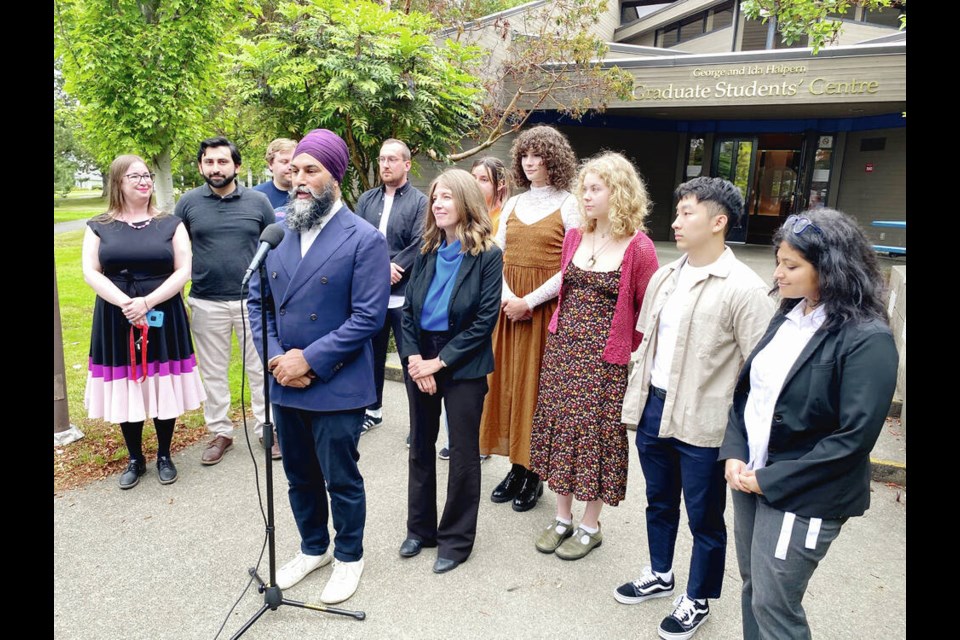Cleo Philp is one of the fortunate students who already has a home for the school year set to begin next week — a two-bedroom apartment where Philp and a roommate split the $2,500 monthly rent.
But the third-year University of Victoria political science student, who also works for the UVic Students’ Society, is aware of a few other students who have decided to live in old vans they fixed up, just one creative solution amid a perennially tight student-housing market.
Philp, 22, was part of a group of UVic students who spoke with federal NDP Leader Jagmeet Singh on Wednesday during his visit to the campus.
Singh’s UVic stop was preceded by a note from his press office saying that there had been “upsetting stories” about some local university students having to live in tents, but none of the students who spoke to the Times Colonist knew of anyone in that situation.
Still, Singh said he has heard from other students in the capital region who are camping until they find a place to rent.
“It’s pretty desperate,” he said. “I want to give students some hope.”
The federal NDP said only 10 per cent of UVic students have access to student housing, leaving about 20,000 students looking for off-campus homes in a competitive market.
Flanked by students at a Wednesday news conference, Singh said housing is a major concern across the country but “it’s particularly a concern with students.”
“Students who are finishing their education have maybe some employment, some income coming in, but certainly not enough to compete with the rest of the folks who have jobs that also can’t find housing.”
January statistics from the Canada Mortgage and Housing Corporation pegged Victoria’s vacancy rate at 1.5 per cent, with the average monthly rental for an apartment almost $1,700.
The NDP is proposing a federal cost-sharing mechanism where the government, educational institutions and provinces each pay one-third of the cost to build housing that is “fitting the needs of students, that are actually affordable so they can focus on their studies,” Singh said.
He said the B.C. government has already worked with some schools, “but they need a federal partner that is equally committed to building homes that are affordable.”
The idea of converting vacant commercial buildings into student housing could also be considered, Singh said.
There are successful approaches elsewhere, he said — in Europe, rent is capped at one-third of a graduate student’s income.
In Nanaimo, Vancouver Island University is encouraging homeowners to offer rooms in their homes to students, using lawn signs and social media to spread the message. VIU also appealed to hotels to offer discounted rates for students who need to stay for a few weeks while they continue their search.
Singh said he has been told about students who have to live in one-bedroom suites with three roommates or in substandard conditions because it’s all they can afford.
“We’ve got to make sure students have a home,” he said. “This is investing in our future.”
Hearing from UVic students on Wednesday has made him even more motivated to solve their housing problems, he said.
While it’s nice to have stable accommodation, Philp said the rent is “abhorrent” — the roommates pay $1,250 a month each for a two-bedroom apartment in the downtown area. The rent is double what the two paid previously, but they felt fortunate to find it.
“It was the only place we could find that wasn’t a downtrodden basement suite,” Philp said. “We got really lucky with it.”
Philp’s friend Lane Cooke pays slightly less at $1,000 a month for a space shared with a roommate and also feels she is lucky to be there.
Others have it tougher, said the 20-year-old Cooke, who is taking political science and gender studies at UVic.
She said she had two friends crashing at her place a few weeks ago after they were evicted, had no place to go and were out of options. “If they didn’t have that support network, they would be living in their car.”
UVic said in a statement that when its newest residence building, Sngequ House, opens in September, it will bring the number of on-campus student beds to more than 2,900 – the “most ever.”
The university said that for the 2023-24 school term, it will be able to provide residence beds for all first-year students who applied by the May 30 deadline.
Another new residence complex opened last fall, said the university, adding, however, that demand for housing continues to exceed supply, so many students will be looking for off-campus accommodations.
The university noted that it has a website where students can search for off-campus housing and landlords can post listings, with information on tenancy rights and resources and tools related to how to find places to live.
“We are listening to students and will continue working with our partners, including all levels of government, as well as the UVic Students’ Society and Graduate Students’ Society, to address this regional issue and advocate for longer-term solutions,” the university said.
Camosun College, meanwhile, is working toward creating its first on-campus housing in partnership with the province.
>>> To comment on this article, write a letter to the editor: [email protected]



